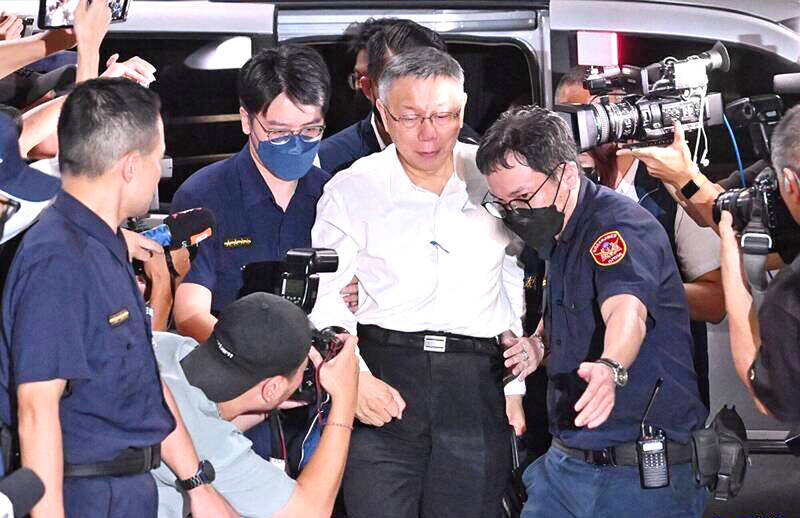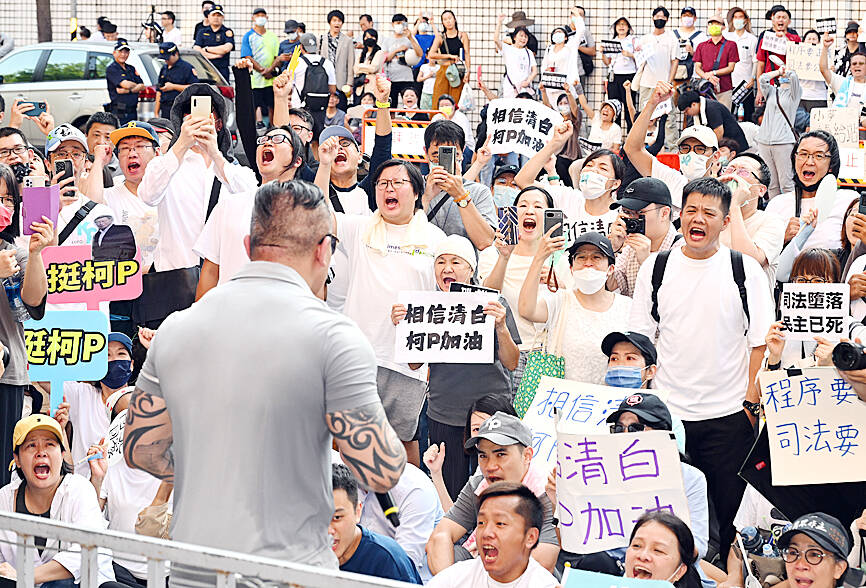Taiwan People’s Party (TPP) Chairman Ko Wen-je (柯文哲) was arrested early yesterday morning after being questioned by prosecutors over his alleged role in a corruption scandal concerning the Core Pacific City redevelopment project during his tenure as Taipei mayor.
The arrest was made after Ko refused to be questioned at night and attempted to leave the prosecutors’ office, the Taipei District Prosecutors’ Office said.
Prosecutors were worried that he would collude with others involved in the case to make false statements if they allowed him to leave, so they issued an order to arrest him, the office said.

Photo: Liu Wan-lin, Taipei Times
Ko yesterday sought a court ruling on the legitimacy of his arrest.
The Taipei District Court turned down his request later in the day.
Cheng Shen-yuan (鄭深元), Ko’s lawyer, said it was very late and Ko could not undergo further questioning.

Photo: Liao Chen-huei, Taipei Times
Ko was summoned by the Agency Against Corruption on Friday and was questioned for about 12 hours before being sent to the prosecutors’ office early yesterday for more questioning.
A detention hearing was ongoing at press time last night.
An investigation into alleged corruption involving Ko and several others in the redevelopment of Core Pacific City in Taipei started amid suspicion about an increase in the floor area ratio (FAR) for the project from 560 percent to 840 percent during Ko’s time as mayor from 2014 to 2022.
The FAR refers to the ratio of a building’s total floor area to the size of the parcel of land upon which it is built. A higher FAR helps property developers make more profit due to expanded property value.
In May, Ko and others were named as suspects in the investigation.
Prosecutors also questioned officials from Ko’s administration, including former Taipei deputy mayor Peng Cheng-sheng (彭振聲).
Citing the Code of Criminal Procedure (刑事訴訟法), prosecutors said the arrest order was issued after Ko was informed of its necessity and his rights.
Prosecutors said that if Ko had been allowed to leave the office before they had finished questioning him, the risk that the investigation would be hindered would have increased.
The TPP yesterday morning in a statement urged the court to look into the legitimacy of Ko’s arrest and vowed to support its chairman’s rights.
Ko was questioned by the Agency Against Corruption before at about 12:30am yesterday being sent to the prosecutors’ office, where questioning continued until about 2am, the party said.
“During the questioning at the prosecutors’ office, Ko declined to be questioned at night, but prosecutors insisted the session would continue,” it said.
As Ko had faced nearly 19 hours of questioning, he declined to be questioned any more at that time, as he felt exhausted, it said.
The arrest was aimed at restricting Ko’s freedom of movement and the court should give him justice, it said.
Ko’s wife, Peggy Chen (陳佩琪), was also summoned on Friday by prosecutors as a witness in the case.
She was allowed to leave after being questioned.
Before Ko and his wife were summoned, prosecutors searched the former mayor’s home, office and the TPP’s headquarters.
Peng was summoned again on Friday for questioning.
He had also been questioned on Aug. 12.
He has been barred from leaving Taiwan.
Early yesterday morning, prosecutors sought to detain Peng, citing his involvement in the case.
Taipei City Councilor Ying Hsiao-wei (應曉薇) of the Chinese Nationalist Party (KMT) and business tycoon Sheen Ching-jing (沈慶京), the chairman of Core Pacific Group (威京集團), which is in charge of the Core Pacific City project, were detained and held incommunicado late on Thursday night and early on Friday respectively.
Ying’s assistant Wu Shun-min (吳順民) is also being held in detention and incommunicado.
Sheen allegedly gave Ying more than NT$47.4 million (US$1.48 million) as part of his company’s effort to lobby the Taipei City Government to increase the FAR, prosecutors said.
In February 2020, Sheen, via an introduction by Ying, visited Peng several times, asking for the FAR to be boosted, prosecutors said.
Prosecutors said they were also looking into the flow of additional funds Sheen allegedly gave Ying.
Besides being former Taipei mayor, Ko was a presidential candidate for his party in January’s election, winning more than 25 percent of the vote, an unprecedented achievement by a minor opposition party in Taiwan.
His success in the election is widely seen as changing the nature of politics in Taiwan, which had previously been dominated by two major parties.

CHAOS: Iranians took to the streets playing celebratory music after reports of Khamenei’s death on Saturday, while mourners also gathered in Tehran yesterday Iranian Supreme Leader Ayatollah Ali Khamenei was killed in a major attack on Iran launched by Israel and the US, throwing the future of the Islamic republic into doubt and raising the risk of regional instability. Iranian state television and the state-run IRNA news agency announced the 86-year-old’s death early yesterday. US President Donald Trump said it gave Iranians their “greatest chance” to “take back” their country. The announcements came after a joint US and Israeli aerial bombardment that targeted Iranian military and governmental sites. Trump said the “heavy and pinpoint bombing” would continue through the week or as long

TRUST: The KMT said it respected the US’ timing and considerations, and hoped it would continue to honor its commitments to helping Taiwan bolster its defenses and deterrence US President Donald Trump is delaying a multibillion-dollar arms sale to Taiwan to ensure his visit to Beijing is successful, a New York Times report said. The weapons sales package has stalled in the US Department of State, the report said, citing US officials it did not identify. The White House has told agencies not to push forward ahead of Trump’s meeting with Chinese President Xi Jinping (習近平), it said. The two last month held a phone call to discuss trade and geopolitical flashpoints ahead of the summit. Xi raised the Taiwan issue and urged the US to handle arms sales to

State-run CPC Corp, Taiwan (CPC, 台灣中油) yesterday said that it had confirmed on Saturday night with its liquefied natural gas (LNG) and crude oil suppliers that shipments are proceeding as scheduled and that domestic supplies remain unaffected. The CPC yesterday announced the gasoline and diesel prices will rise by NT$0.2 and NT$0.4 per liter, respectively, starting Monday, citing Middle East tensions and blizzards in the eastern United States. CPC also iterated it has been reducing the proportion of crude oil imports from the Middle East and diversifying its supply sources in the past few years in response to geopolitical risks, expanding

Pro-democracy media tycoon Jimmy Lai’s (黎智英) fraud conviction and prison sentence were yesterday overturned by a Hong Kong court, in a surprise legal decision that comes soon after Lai was jailed for 20 years on a separate national security charge. Judges Jeremy Poon (潘兆初), Anthea Pang (彭寶琴) and Derek Pang (彭偉昌) said in the judgement that they allowed the appeal from Lai, and another defendant in the case, to proceed, as a lower court judge had “erred.” “The Court of Appeal gave them leave to appeal against their conviction, allowed their appeals, quashed the convictions and set aside the sentences,” the judges